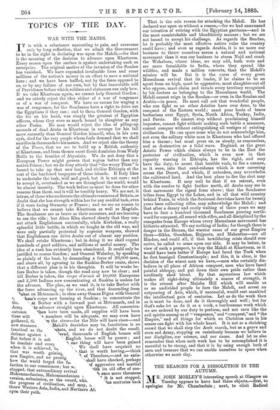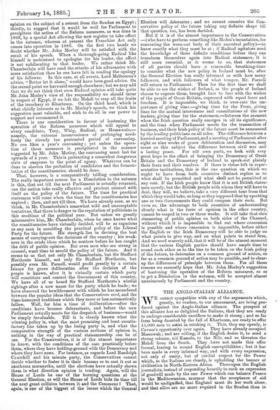THE REASONS FOR A DISSOLUTION IN THE AUTUMN.
MR. JOHN MORLEY'S interesting speech at Glasgow on Tuesday appears to have had three objects,—first, to apologise for Mr. Chamberlain ; next, to elicit Radical opinion on the subject of a retreat from the Soudan on Egypt ; thirdly, to suggest that it would be well for Parliament to precipitate the action of the Reform measures, as was done in 1868, by a special Act allowing the new register to take effect in the autumn, whereas at present the Franchise Act only comes into operation in 1886. On the first two heads we doubt whether Mr. • John Morley will be satisfied with the result of his speech. When a thorough-going Radical like himself is understood to apologise for his leader, the effect is not exhilarating to that leader. We rather think Mr. Chamberlain will have read the attacks of his adversaries with more satisfaction than he can have felt in reading the apology of his follower. In this case, at all events, Lord Melbourne's advice, "Better let it alone," would have been good advice. On the second point we have said enough elsewhere; but we may add that we do not think that even Radical opinion will take quite Mr. John Morley's view of the responsibility we should incur in respect of Egypt, if we left the Mandi to reap all the fruits of the treachery at Khartoum. On the third head, which is what chiefly interests us in Mr. Morley's speech, we think his suggestion most valuable, and wish to do all in our power to support and recommend it. There is one consideration in favour of hastening the operation of the Reform measures which will appeal to every candidate, Tory, Whig, Radical, or Home-rule,namely, the extreme inconvenience of prolonging needlessly the already too protracted period of canvassing. No one likes a year's canvassing ; yet unless the operation of these measures is precipitated in the manner suggested by Mr. John Morley, the canvassing must last for upwards of a year. This is protracting a somewhat dangerous state of suspense to the point of agony. Whatever can be done to shorten the probation of candidates and the fermentation of the constituencies, should be done.
That, however, is a comparatively trifling consideration. The really important reason for a Dissolution in the autumn is this, that not till the next Parliament is actually returned, can the nation take really effective and prudent counsel with itself on the policy of the future. The time for practical statesmen will come when the time for the constituencies has expired ; then, and not till then. We have already seen, as we think, in Mr. Chamberlain's somewhat wild and unacceptable tentatives, that there is danger to the reputation of politicians in this seedtime of the political year. But unless we greatly misconceive him, Mr. Chamberlain, when he once knows what the constituencies have virtually decided, will be as sagacious as any man in moulding the practical policy of the Liberal Party for the future. His strength lies in devising the best means of carrying-out the decisions of the country ; his weakness in the crude ideas which he scatters before he has caught the drift of public opinion. But even men who are strong in counsel, want time to mould the policy of the future. And it seems to us that not only Mr. Chamberlain, but Sir Stafford Northcote himself, not only Sir Stafford Northcote, but possibly even Mr. Parnell, would profit greatly by a certain leisure for grave deliberation after the decision of the people is known, after it is virtually certain which party will constitute and control the Government of this country. We have all of us heard Sir Stafford Northcote's wistful sighings after a new name for the party which he leads ; we have observed the bewilderment with which he has meandered between the popular ideas that the Conservatives need, and the time-honoured traditions which they more or less automatically follow. Well, for him a time of deliberation—after the conditions have become determinate, and before the new Parliament actually meets for the despatch of business—would be simply invaluable. Till it is clearly known what the winning policy is, what the most promising and least unsatisfactory line taken up by the losing party is, and what the comparative strength of the various sections of opinion is, nothing in the way of practical statesmanship can be of use. For the Conservatives, it is of the utmost importance to know, with the conditions of the case practically before them, where they have holding-ground with the Democracy and where they have none. For instance, as regards Lord Randolph Churchill and his minute party, the Conservatives cannot decide whether to foster it in their bosoms or to cast it out as anathema maranatha, until the elections have actually shown them in what direction opinion is tending. Again, will the House of Lords be one of the burning questions at the General Election, or will the House of Lords bide its time till the next great collision between it and the Commons That again, is one of the biggest of the issues which the General Election will determine ; and we cannot conceive the Conservative policy of the future taking any definite shape till that question, too, has been decided.
But if it is of the utmost importance to the Conservatives —(who have to perform something like Medea's incantation, for renovating the worn-out body of their ancestral policy)—to know exactly what they must be at ; if Radical agitators need the knowledge of these definite conditions before they can transform themselves again into Radical statesmen, it is still more essential, as it seems to us, that statesmen of all parties should have a reasonable breathing-time to consider what the new policy in Ireland must be, after the General Election has really informed us with how many followers, and with followers of what temper, Mr. Parnell will return to Parliament. Then for the first time we shall be able to see the wishes of Ireland, as the people of Ireland choose to express them, brought face to face with the wishes of the people of Great Britain, expressed with equal force and freedom. It is impossible, we think, to over-rate the importance of giving time,—giving time for the Press, giving time for the mutual intercourse and consultations of the new leaders, giving time for the statesmen,—between the moment when the Irish question really emerges in all its significance, and the time when Parliament meets for the transaction of business, and their Irish policy of the future must be announced by the leading politicians on all sides. The difference between a hurried meeting of Parliament,and a meeting of Parliament after eight or nine weeks of grave deliberation and discussion, may mean on this subject the difference between civil war and a lasting peace. For otlt own part's, we look with very great hope to the effect of bringing the Democracy of Great Britain and the Democracy of Ireland to speak-out plainly their fears and their resolves. If there is virtue left in representative institutions, this is the one question on which we ought to have from both countries distinct replies as to what shall be permitted and what shall not be permitted at any cost. If the Irish people know that it is not British statesmen merely, but the British people with whom they will have to deal, they will, we believe, take a very different tone from that which they would take, so long as they supposed that by upsetting one or two Governments they could compass their ends. But even so, the advantage to both countries of understanding clearly what is the force of opinion in the other country, cannot be reaped in two or three weeks. It will take that slow simmering of public opinion on both sides of the Channel, without which it is impossible to find out where concession is possible and where concession is impossible, before either the English or the Irish Democracy will be able to judge on what points to give way, and on what points to stand firm. And we need scarcely add, that it will be of the utmost moment that the various English parties should have ample time to sound each other as to the line to be taken on the Irish policy of the future, to determine on a common ground of action, so far as a common ground of action may be possible, and to clearup the differences of principle between them. For all these reasons we earnestly hope that Mr. John Morley's suggestion of hastening the operation of the Reform measures, so as to get a Dissolution in the autumn, will be accepted almost unanimously by Parliament and the country.



































 Previous page
Previous page